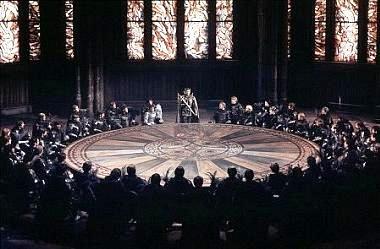A philosophical treatise dealing with the problematic nature of the tripartite God being made flesh. Considers the problem of the dead king being at once an incarnation of God on Earth and the pre-figuration of his descendant.
The writing questioning the essence of God on Earth and King on Earth extends the definition of both God and Monarch outwards from singularity into a totality of presence. de Ford argues that should a King arrange a room on such a way that pleases him aesthetically, that room is then part and parcel of the thing– and because he argues that the King is a kind of God, any room so designed must be an extension of Godhead.
The work is also noted for asides the author has ascribed to various prominent thinkers, though the authenticity is suspect even for the casting of Socrates in a defense of philosophical writings. More suspect are the interpolations assigned to Arthur, ratified by Merlin, and claimed as ‘directive letters’ to his court. It is believed these asides are the complete invention of Sir Ford, though critic Matthew Arnold disagreed. He praised the book for insisting that each thing in the formed world, rather than the ideal of Plato, if well made and well thought consists of the same sweetness and light he found in the ancient Greeks. Specifically, Arnold wrote:
“We must not fall into the trap, however usually convincing, of believing in the stories of Arthur as a mystical light among the darkness. We must not continue this sad state of finding ourselves only in a perpetual age of dismal darkness. Rather, with that understanding of beauty– as Arthur himself writes in de Ford’s work– we know that the difficulties of the time were only of the light confronting other light. The country, and indeed the universe, is best put to the understanding that the Quest for total enlightenment, containing truth and indeed beauty as equals, is the entire endeavor civilized humanity is engaged in undertaking.”
Most importantly, however, the book opens with the often quoted line, “the King is dead, long live the God”, though most who have made use of the quote ever reverse the saying.

